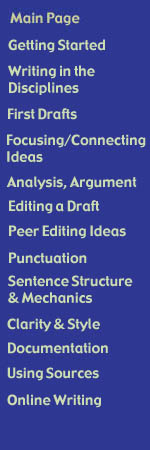

 Writing a Literature Review: Asking Good Questions
Writing a Literature Review: Asking Good Questions
(printable version here)
by Joe Essid, Writing Center Director. Prepared with the help of Dr. Gill Hickman, Jepson School of Leadership Studies
So What is a Literature Review?
Do not be intimidated by the term. In fact, one might compare this sort of assignment to detective work. The process begins with a question worth asking about the topic, then moves through gathering and evaluating sources online and in print. Like a detective, a writer doing research will not always know answers, but the detective will begin with a question that leads to more questions and, in time, clues and evidence.
Starting With A Good Question
First, DO NOT start with a thesis.
That is, avoid starting with a claim to govern the topic. You will derive one during your detective work as you do the review. Be ready for it to change as you do more research. Early in the process, however, it is not possible to have a claim ready made for a topic.
It is, however, possible to ask a great question. Here is one about the topic "Multiple and Emotional Intelligence." Dr. Hickman's students work with this idea, so if Dr. Essid were in the class, he would start by crafting a question he might use as a starting point.
He also would begin by stating his bias about the topic, that is, how prior knowledge or experience might shape the research. Normally, we try to avoid bias in projects such as this, but it is hard to do. Knowing one's observational bias provides the first defense in avoiding it.
Here is Dr. Essid's admitted bias: he is a visual learner (that is, he possesses "spatial intelligence"). From this admission, Essid creates a research question to guide his detective work:
- How useful is spatial intelligence in democratic organizations?
This is, of course, a large question. To begin answering it, Essid would develop a set of keywords for the library search, such as "multiple intelligence," "spatial intelligence," or maybe "visual learner."
Recognizing What You Do Not Yet Know
Good keywords help locate sources to begin answering the question. Smaller dependent questions should then arise for a writer.
For the example above, here is a brainstorming list of possible secondary questions to reflect what the writer does not (but would love to) know:
- Who are some well known figures who have demonstrated spatial intelligence?
- How well have they done in the workplace? As leaders?
- When has their form of intelligence proven most useful? Least?
- Have they found that working in teams of different sorts of individuals led to better results? If so, how so?
This process may seem backward to writers who have been taught to reason from a predetermined thesis. That approach, however, is deadly to academic reasoning. See the Writer's Web page on The Thesis Statement: Where to End, Not Begin for ways to avoid the trap.
Back to 'Getting Started'
Writer's Web | Writing Center | Make
an Appointment | Library
Copyright Info